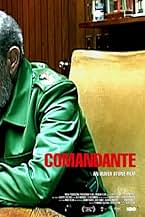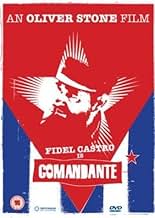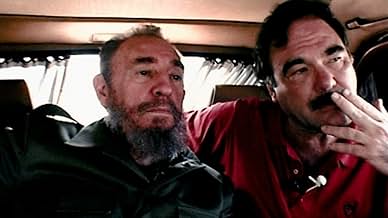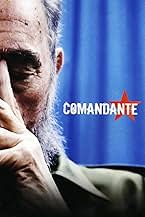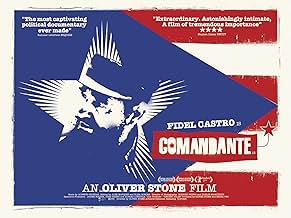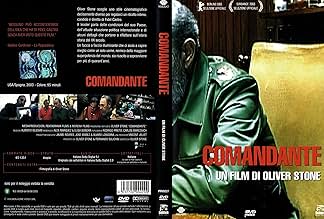AVALIAÇÃO DA IMDb
6,9/10
4 mil
SUA AVALIAÇÃO
Documentário sobre o encontro do diretor Oliver Stone com Fidel Castro.Documentário sobre o encontro do diretor Oliver Stone com Fidel Castro.Documentário sobre o encontro do diretor Oliver Stone com Fidel Castro.
- Direção
- Roteirista
- Artistas
Ernesto 'Che' Guevara
- Self
- (cenas de arquivo)
John F. Kennedy
- Self
- (cenas de arquivo)
Richard Nixon
- Self
- (cenas de arquivo)
Janet Reno
- Self
- (cenas de arquivo)
Jaume Roures
- Self
- (não creditado)
Santiago Segura
- Self
- (não creditado)
Avaliações em destaque
This film is an interesting document only because it provides a glimpse into the leader's more trivial pursuits. ("I've seen TITANIC on video. It needs a big screen" says Castro.) It fails miserably where Oliver Stones asks tough questions yet fails to pursue the partial answers, or at times total avoidance of the question altogether.
Some of the issues talked around are surprising (The CIA role in Angola, Cuba's AIDS quarantine camps, the role of Miami exiles, 1980's prison camps for gays) while others are just bizarre (the lack of multiple parties in Cuban elections, his son's US education, Nicaragua and Venezuela).
The documentary instead puts us through yet another series of Che Guevara tales told less than honestly by Fidel. The frequent shots of Eva Peron suggest that Fidel Castro's revolution is not a failed relic but rather the dreamy illusions of yet another misguided albeit glamorous femme fatale.
Some of the issues talked around are surprising (The CIA role in Angola, Cuba's AIDS quarantine camps, the role of Miami exiles, 1980's prison camps for gays) while others are just bizarre (the lack of multiple parties in Cuban elections, his son's US education, Nicaragua and Venezuela).
The documentary instead puts us through yet another series of Che Guevara tales told less than honestly by Fidel. The frequent shots of Eva Peron suggest that Fidel Castro's revolution is not a failed relic but rather the dreamy illusions of yet another misguided albeit glamorous femme fatale.
I just saw Comandante on Greek public television, in its entirety and uninterrupted and was immediately drawn to it.
Whether one agrees with Cuba's political system or not, is not the issue here. What Oliver Stone has achieved is what no journalist or historian has ever come close to. He brings himself and his crew right up close to the aged leader and confronts him relentlessly with questions from the mundane to the esoteric and from the political to the personal. Ideas about the past and the future, about dreams, art, democracy, colonialism, family, religion, women's rights, education, love etc are all exposed here, bringing out an intimate portrait. The questions are often uncomfortable as when Stone asks Castro about his ex wives in front of his wife, or when his claims about policing in Cuba are denied by one of Stone's crew members. Yet Castro even at this age, is sharp, humorous and poetic in a way that reveals the intellectual behind the politician.
It is also a travel documentary of Havana where Fidel Castro is Stone's guide and walks him through the city's monuments and cafés, sits next to him at the back seat of his car, eats and drinks with him and we get a sense that he knows what is happening in Havana's every alley.
One thing is for sure: no other country leader would ever allow himself the closeness Castro offers to Stone and expose his feelings and doubts with such spontaneity.
Stone turns a formal encounter into a family visit and brings the audience to meet an iconic political figure and spend a couple of intimate hours with him.
A work that leaves you thinking for a long while.
Whether one agrees with Cuba's political system or not, is not the issue here. What Oliver Stone has achieved is what no journalist or historian has ever come close to. He brings himself and his crew right up close to the aged leader and confronts him relentlessly with questions from the mundane to the esoteric and from the political to the personal. Ideas about the past and the future, about dreams, art, democracy, colonialism, family, religion, women's rights, education, love etc are all exposed here, bringing out an intimate portrait. The questions are often uncomfortable as when Stone asks Castro about his ex wives in front of his wife, or when his claims about policing in Cuba are denied by one of Stone's crew members. Yet Castro even at this age, is sharp, humorous and poetic in a way that reveals the intellectual behind the politician.
It is also a travel documentary of Havana where Fidel Castro is Stone's guide and walks him through the city's monuments and cafés, sits next to him at the back seat of his car, eats and drinks with him and we get a sense that he knows what is happening in Havana's every alley.
One thing is for sure: no other country leader would ever allow himself the closeness Castro offers to Stone and expose his feelings and doubts with such spontaneity.
Stone turns a formal encounter into a family visit and brings the audience to meet an iconic political figure and spend a couple of intimate hours with him.
A work that leaves you thinking for a long while.
It warms my heart to discover that there are human beings in charge on some parts of the planet. Stone's documentary, although annoyingly pop videoish in places shows us the human side of Castro. I do not care where your politics lie, who can argue with a policy of housing, education and health care for all. Castro is portrayed by the US in an uncomplimentary light, well its good to know not all Americans feel that he is a ruthless dictator.
I want to know what Bush would say about crime, prostitution, religion, war and torture. He would not only deny it he would outright claim his country to be perfect. well nobody or country is perfect, and a least Castro can admit this. I just think of all he has achieved with one hand tied behind his back, it put's the West to shame, if his democracy is different to our's, who are we to say he is wrong!
I want to know what Bush would say about crime, prostitution, religion, war and torture. He would not only deny it he would outright claim his country to be perfect. well nobody or country is perfect, and a least Castro can admit this. I just think of all he has achieved with one hand tied behind his back, it put's the West to shame, if his democracy is different to our's, who are we to say he is wrong!
10gavin-96
Watching recent documentaries from writers such as Michael Moore, one may be confused to what a documentary actually is. Comandante is a perfect example of what a documentary should be like. By the end of its running, the viewer has seen a balanced account with enough information either way to give food for thought.
I came away from this asking myself - 'is Castro a truly great man?', or is he 'full of ***t'?, or on the other hand has he just not practiced what he has preached?
Moore on the other hand comes from a journalistic angle, everything so over emphasised and dramatised, as if he is almost trying to convince the viewer to agree with him. He presents information through his own paradigm of the opinion he is carrying at the time.
Comandante is a mature documentary, flawless in presentation as Stones work generally is; but the key to its quality, is that it does not give you the answer. It documents the facts.
Comandante easily achieves what it sets out to do. Some viewers may expect more given the subject, but for the purist, satisfaction guaranteed.
I came away from this asking myself - 'is Castro a truly great man?', or is he 'full of ***t'?, or on the other hand has he just not practiced what he has preached?
Moore on the other hand comes from a journalistic angle, everything so over emphasised and dramatised, as if he is almost trying to convince the viewer to agree with him. He presents information through his own paradigm of the opinion he is carrying at the time.
Comandante is a mature documentary, flawless in presentation as Stones work generally is; but the key to its quality, is that it does not give you the answer. It documents the facts.
Comandante easily achieves what it sets out to do. Some viewers may expect more given the subject, but for the purist, satisfaction guaranteed.
This film is a fantastic, hypnotic encounter with the legendary Marxist, world agitator and bete noire to America, Fidel Castro. It features left-wing warrior Oliver Stone's trademark flash cutting and controversial storytelling, alongside a simply stunning musical score from Alberto Iglesias. Prepare for the Buena Vista Social Club (2001) on revolutionary acid.
The beginning of Commandante yet another Oliver Stone masterpiece is similar to the beginning of his epic JFK (1991): lots of archive footage of Castro and Cuba, only this time intercut with masses of frenzied crowds drunk on revolutionary fervour, all shouting 'Fidel, Fidel', hailing their great man who is still there in this film, forty years later. Incredible.
There is both 1960s and modern footage of Havana featuring giant murals of 'Che' Guevara, Fidel ('VIVA FIDEL CASTRO') and a total absence of any corporate, Western advertising whatsoever. There is a lot of poverty, but also a series of impromptu meetings between Castro (and Stone) and various Cubans in the streets. Propaganda or planned? The movie harks back to the original revolution in 1959 and Castro's initial pro-Western peoples revolution, hailing (in English) 'representative democracy' and 'social justice'. Of course, the American corporations and political elite could never countenance any notion of true democracy just ninety miles from their corrupt lands and so the story unfolds of how various presidents tried to invade the island and destroy their path.
Fidel himself at 80 is surprisingly fit and optimistic, always in his olive green military fatigues. He appears to be a genuine messiah, despite the paradox of religion and atheistic communism in this island paradise. He wears his customary beard, is polite and genuinely sincere. Castro and Oliver Stone in a remarkably frank and candid series of interviews go on to discuss everything from politics, film, women and nationalism. Castro admires Sophia Loren, Charlie Chaplin, Khruschev, Gorbachev, Depardieu and a host of others. He has watched Titanic and Gladiator but hates Nixon who he considers the originator of the American hatred of his island yet feels sorry for Kennedy for being assassinated.
Could George W Bush even consider for one second walking the streets of his capital city? No, he would be strung up as a corrupt war criminal and stooge to all of the corporate giants that have been banished from Cuba (Texaco, Gulfoil, McDonalds, etc.).
In the original 1960s footage Castro is hailed by crowds of literally one million people. He is a strange combo of Dr Caligari, Karl Marx and the Pope.
The beginning of Commandante yet another Oliver Stone masterpiece is similar to the beginning of his epic JFK (1991): lots of archive footage of Castro and Cuba, only this time intercut with masses of frenzied crowds drunk on revolutionary fervour, all shouting 'Fidel, Fidel', hailing their great man who is still there in this film, forty years later. Incredible.
There is both 1960s and modern footage of Havana featuring giant murals of 'Che' Guevara, Fidel ('VIVA FIDEL CASTRO') and a total absence of any corporate, Western advertising whatsoever. There is a lot of poverty, but also a series of impromptu meetings between Castro (and Stone) and various Cubans in the streets. Propaganda or planned? The movie harks back to the original revolution in 1959 and Castro's initial pro-Western peoples revolution, hailing (in English) 'representative democracy' and 'social justice'. Of course, the American corporations and political elite could never countenance any notion of true democracy just ninety miles from their corrupt lands and so the story unfolds of how various presidents tried to invade the island and destroy their path.
Fidel himself at 80 is surprisingly fit and optimistic, always in his olive green military fatigues. He appears to be a genuine messiah, despite the paradox of religion and atheistic communism in this island paradise. He wears his customary beard, is polite and genuinely sincere. Castro and Oliver Stone in a remarkably frank and candid series of interviews go on to discuss everything from politics, film, women and nationalism. Castro admires Sophia Loren, Charlie Chaplin, Khruschev, Gorbachev, Depardieu and a host of others. He has watched Titanic and Gladiator but hates Nixon who he considers the originator of the American hatred of his island yet feels sorry for Kennedy for being assassinated.
Could George W Bush even consider for one second walking the streets of his capital city? No, he would be strung up as a corrupt war criminal and stooge to all of the corporate giants that have been banished from Cuba (Texaco, Gulfoil, McDonalds, etc.).
In the original 1960s footage Castro is hailed by crowds of literally one million people. He is a strange combo of Dr Caligari, Karl Marx and the Pope.
Você sabia?
- CuriosidadesAt the beginning of the movie, when Stone and Castro are strolling through the corridors, you see Santiago Segura, dressed in white, standing in front of a group of people.
- ConexõesFeatures Vatel, um Banquete para o Rei (2000)
- Trilhas sonoras11.11
Written and Performed by Paul Kelly
Principais escolhas
Faça login para avaliar e ver a lista de recomendações personalizadas
- How long is Comandante?Fornecido pela Alexa
Detalhes
- Data de lançamento
- Países de origem
- Central de atendimento oficial
- Idiomas
- Também conhecido como
- Son efsane - Comandante
- Empresas de produção
- Consulte mais créditos da empresa na IMDbPro
Bilheteria
- Faturamento bruto mundial
- US$ 135.633
- Tempo de duração1 hora 39 minutos
- Cor
- Mixagem de som
Contribua para esta página
Sugerir uma alteração ou adicionar conteúdo ausente



